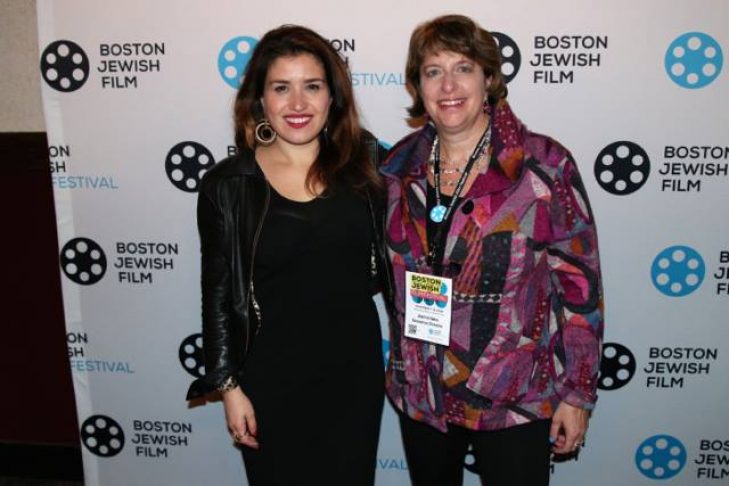During a notable decade-long tenure, Jaymie Saks led Boston Jewish Film (BJF) through a successful rebranding, as well as expanded its mission in the community. She spoke with JewishBoston on the eve of her departure.
What were some of the challenges of leading Boston Jewish Film?
When I started as executive director in the spring of 2009, it was the bottom of the recession. It was tough because the organization received almost 80 percent of its funding from donors and foundations. In the middle of the recession, these donors and foundations were pulling back, and there were no new gifts. People also tend to cut down on entertainment in a recession, so ticket sales were down too.
The film business has also changed. Streaming has changed the landscape quite a bit. Films come out much faster, and they’re more expensive. While there are still many films to choose from, the film festival has less influence than it used to. It’s also easier to make films—technology is more accessible. Consequently, we get a much larger variety of films from a lot more filmmakers in various countries. There is also more competition for getting top films.
What have been some of the joys of leading the BJF?
People ask me a lot, “Does anyone go to the movies anymore, given that we have streaming, Netflix and Amazon?” There is still a great demand and a great desire for people to come together as a community. We also know that for 10 percent of our Jewish audience, this is the only Jewish thing they do all year. We’re touching people and engaging them in Jewish issues in a way they’re not doing in the rest of their lives. We know from the 2015 Greater Boston Jewish Community Study and our own experience that people are looking for new ways to engage with their Jewish identity. They’re proud to be Jewish but not necessarily interested in engaging Jewishly in more traditional ways. We’re proud to be the place that people can come to when they want to connect with their Jewish identity.
You’ve made many innovations during your decade at the BJF helm, including the organization’s rebranding. What led to the name change?
We’re catching up to who we are today. We started as a once-a-year festival. Everything we did all year was leading up to that festival, and that is still a big piece of our work. But over the years we have become a year-round organization that focuses on Jewish film. The organizational name Boston Jewish Film Festival no longer represented who we were. We’re so much more than one festival now. We run many different programs with more than one name. We felt the name Boston Jewish Film better reflected who we had become.
What are some of the new programs you launched?
One of my goals when I came in as executive director was to expand our offerings throughout the year. Why should we only show films in November? Some of it was a function of the film business, where films are coming out throughout the year and people want to see those movies as soon as possible.
We had thought about doing a festival about disabilities. There are so many great disability films to show over a year. ReelAbilities, a national festival, contacted us to host in Boston. Thanks to the generous and ongoing support of the Ruderman Family Foundation, we have valued the opportunity to expand BJF’s offerings. It enables us to highlight Jewish issues in a variety of ways.
After every screening someone inevitably comes up to me and says, “You ought to get these films into the schools.” We’re starting to bring filmmaking classes to urban schools. We’re also showing some of our films in suburban schools. We call this program BJF Studio. It’s still in the pilot phase, but it’s growing.
BJF Studio is also a response to the increasing anti-Semitism we’ve been seeing. We believe that if we can reach people when they’re teenagers, they will have a better understanding of stories from all different ethnic groups, including the Jewish people.
BJF is also launching a film festival dedicated to Israeli films in February. Tell us about that.
One major change that has happened during my tenure is the rise of the Israeli film industry. Israel is one of the top countries in the world doing film and garnering nominations for awards like the Golden Globes. We want to get those films out there. With this festival we hope the Israeli and American communities will come together to watch even more of the amazing films coming out of Israel.
How have you met the challenges of attracting a millennial audience?
We created the FreshFlix brand, and CJP’s young adult initiative was key to getting FreshFlix off the ground. They supported us with grants and with outreach. We knew the Boston Jewish Film Festival was not attracting young professionals. We have worked hard to create programming that will appeal to that demographic. We host those programs in Somerville, closer to where that younger population lives, and closer to public transportation. It’s a neighborhood that attracts people who love the arts and will come out to see arts events.
What’s on the horizon for you after this remarkable 10-year tenure?
I’m going to do a lot of thinking about my next steps. In the meantime, I want to thank the BJF staff, our Board of Directors and the community who have laughed with us, cried with us and have always been there to support us.



